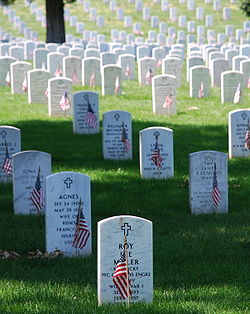Memorial Day Open Thread

A little history of Memorial Day:
It was first observed in 1865 as Decoration Day by liberated slaves, who independently set up, decorated and proclaimed an ad-hoc graveyard – a field of "passionless mounds" – to honor dead Union soldiers.
Here's the original Memorial Day Order: [More...]
The 30th day of May, 1868, is designated for the purpose of strewing with flowers, or otherwise decorating the graves of comrades who died in defense of their country during the late rebellion, and whose bodies now lie in almost every city, village and hamlet churchyard in the land. In this observance no form or ceremony is prescribed, but Posts and comrades will, in their own way arrange such fitting services and testimonials of respect as circumstances may permit.
We are organized, Comrades, as our regulations tell us, for the purpose among other things, "of preserving and strengthening those kind and fraternal feelings which have bound together the soldiers sailors and Marines, who united to suppress the late rebellion." What can aid more to assure this result than by cherishing tenderly the memory of our heroic dead? We should guard their graves with sacred vigilance. All that the consecrated wealth and taste of the nation can add to their adornment and security, is but a fitting tribute to the memory of her slain defenders. Let pleasant paths invite the coming and going of reverent visitors and fond mourners. Let no neglect, no ravages of time, testify to the present or to the coming generations that we have forgotten as a people the cost of a free and undivided republic.
If other eyes grow dull and other hands slack, and other hearts cold in the solemn trust, ours shall keep it well as long as the light and warmth of life remain in us.
Let us, then, at the time appointed, gather around their sacred remains, and garland the passionless mounds above them with choicest flowers of springtime; let us raise above them the dear old flag they saved; let us in this solemn presence renew our pledge to aid and assist those whom they have left among us a sacred charge upon the Nation's gratitude—the soldier's and sailor's widow and orphan.
What are you doing today to remember those who served? My dad served in WWII, here and in France. A chemist, he enlisted, was a medical supply officer and Lieutenant, assigned to hospitals.
I happened to go out to my mom's storage locker yesterday looking for boxes of photos. It was so dusty and dirty, rather than go through the boxes there, I just put a couple that looked like they might have photos in the car.
When I got home and opened them, one contained a beautiful wooden box of mementos and letters. Among them were my dad's war letters to my Mom from Europe, the telegrams my grandparents sent him when my sister was born, his letter back to my Mom about how joyous he was. His letters were also filled with details about the men he served with, particularly at the 194th General Hospital in France.
The photo box had hundreds of tiny photos, most about 3" square, of his army days, here and in France. One photo showed planes in the sky. On the back, he had written "Headed to Germany" and the date, "April, 1945."
I also found his Army honorable discharge certificate. It listed some medals he had been awarded. And, there were photos and letters between him and my uncles -- all of them decked out in their uniforms.
On my mother's side, she always talked about a favorite cousin who died in Pearl Harbor. One of the photos I found was of a handsome young man on a beach with a lei around his neck. I can't help but think that must have been him. I don't even know his name.
My dad died in 2001 at age 82. While he didn't die in the war, it was always a presence. My Mom died this year, two days before Christmas, at age 85. The war was just as much a factor in her life as it was in my dad's.
There are so many who have given their lives for their country, almost all unknown to us, except for those in our immediate families and circle of friends.
Today is for them.
| < Minn. Gov. Vetoes Medical Mariuana for Terminally Ill | "Other Than a Prisoner Of War" > |



